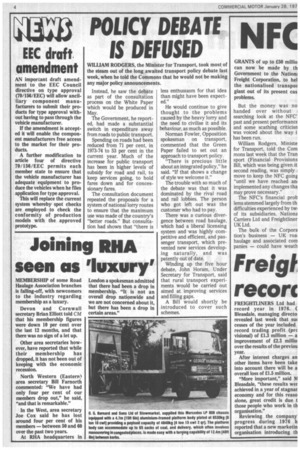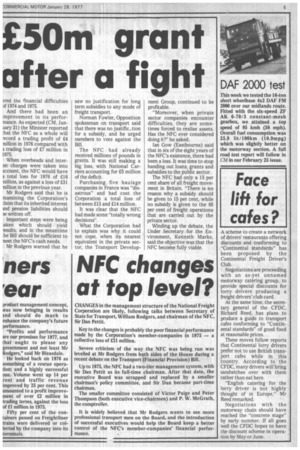NFC £50m grant after a fight
Page 6

Page 7

If you've noticed an error in this article please click here to report it so we can fix it.
GRANTS of up to £50 millio can now be made by th Government to the Nation: Freight Corporation, to hel the nationalised transom giant out of its present cas problems.
But the money was no handed over without . searching look at the NFC' past and present performancE and some scathing criticisn was voiced about the way i has been run.
William Rodgers, Ministe for Transport, told the Com mons last week that the Iran sport (Financial Provisions Bill, which was being given it second reading, was simply move to keep the NFC goin "until we have reached an implemented any changes tha may prove necessary."
The NFC's financial prob lems stemmed largely from th difficulties experienced by twl of its subsidiaries. Nationa Carriers Ltd and Freightliner UK Ltd.
The bulk of the Corpora tion's business — UK roa, haulage and associated corn panies — could have weath ered the financial difficulties of 1974 and 1975.
And there had been an improvement in its performance. As expected (CM, January 21) the Minister reported that the NFC as a whole will -ecord a trading profit of £4 million in 1976 compared with a trading loss of £7 million in 1975.
When overheads and inter st were taken into account, the NFC would have total loss for 1976 of £16 million, as against a loss of £31 million in the previous year.
Mr Rodgers said that he is examining the Corporation's :laim that its inherited interest and pension liabilities should 3e written off.
Important steps were being :aken which should yield -esults, and in the meantime ;he Bill should be sufficient to meet the NFC's cash needs.
Mr Rodgers warned that he saw no justification for long term subsidies to any mode of freight transport.
Norman Fowler, Opposition spokesman on transport said that there was no justific_tion for a subsidy, and he urged members to vote against the Bill.
The NFC had already received millions of pounds in grants. It was still making a big loss, with National Carriers accounting for £5 million of the deficit.
Purchasing five haulage companies in France was "disastrous" and had cost the Corporation a total loss of between £13 and £14 million.
It was clear that the NFC had made some "totally wrong decisions".
What the Corporation had to explain was why it could not cope, when its nearest equivalent in the private sector, the Transport Develop ment Group, continued to be profitable.
"Moreover, when private sector companies encounter difficulties, they are sometimes forced to realise assets. Has the NFC ever considered doing it?" he asked.
Ian Gow (Eastbourne) said that in six of the eight years of the NFC's existence, there had been a loss. It was time to stop handing out loans, grants and subsidies to the public sector.
The NFC had only a 15 per cent share of all freight movement in Britain. "There is no reason why a subsidy should be given to 15 per cent, while no subsidy is given to the 85 per cent of freight operations that are carried out by the private sector.
Winding up the debate, the Under Secretary for the Environment, Kenneth Marks, said the objective was that the NFC become fully viable.


































































































